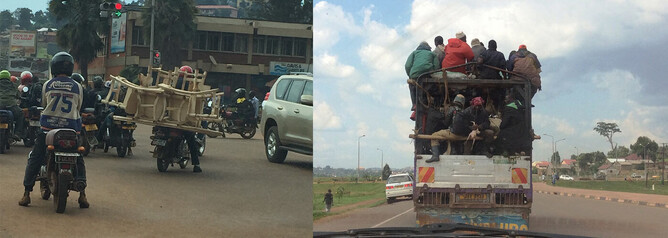It has been a long time since we ‘hit the field’. We arrived in Papua New Guinea in November 1987 and were thrown immediately into work, managing the guesthouse at our PNG headquarters. We were also thrown into the cultural deep end when we found ourselves in the middle of tribal fighting. The fighters were even jumping our fence and fighting in the centre. We were having to drive through fighting on the road to take missionary families to meet their flights in Goroka (we were glad they only fought with bows and arrows in those days). Now, 33 years later, we are ‘retired from the field’ and adjusting to life back in Australia. We are now finding it difficult to visualize how life was in PNG. It was certainly a different world! Coming back home after four or five years on the field was always a bigger shock to us than arriving on the field. Arriving on the field was an adventure and we expected things to be different.
Once we moved into a village to minister to the Benabena people we found ourselves more involved with the culture. Mumus (cooking food in the ground) were a common occurrence which the people have at every cultural event. Then there were the times when I got up while it was still dark and feeling my way to the house where the people were meeting to find a bride for one of the young men. From there we hopped into a vehicle and drove to the village where lived the girl whom they felt would be a good wife for the groom. We arrived just as it was getting light and they undid a parcel of 20, 10 and 5 Kina notes and arranged them in a circle with the different coloured notes in a pattern. There was about K 1,500 (about $750) there. When the family got up and came out they were surprised to find the money spread out at their front door. The family negotiated with our group regarding the ‘bride price’ then gave the money back, meaning that they didn’t want the girl to marry him and so rejected the money. We went to a couple of other villages on other mornings until they accepted the money.
Ceremonies are a major part of their culture. There were the girl’s coming-of-age ceremonies where she is declared ready to marry. Then there were the wedding ceremonies that were totally different to anything we had ever seen before. After speeches, several men from the bridegroom’s group went to the bride’s side and fought to get the bride and carried her to his side. But the groom to be was not even allowed to be there. We found out that their concept of marriage is very different from ours. They view the wedding as a contract between a man’s clan and a woman’s clan. Therefore, the major event is the ceremony where the bride becomes a member of the bridegroom’s clan. The bride then lives with his family while he lives in another village. The bride’s family helps her get her garden going, then the bridegroom comes and after a small ceremony they can live together. To them she is the bread (or sweet potato) winner. As you can imagine this was all new to us so, we used up a lot of pens and notebooks.
Another ceremony that was new to us was the initiation ceremony. I had the opportunity of witnessing this and it was a real shock to me. They believe that women contaminate men, so they have to get rid of the mothers’ milk from the young teenage boys. The boys were rounded up amidst a lot of singing and blowing of bamboo flutes and taken to the men’s house. They were then subjected all night to the heat and smoke of a roaring fire, singing and a good talking-to regarding their past behaviour. Early next morning, while it was still dark, we went to a creek amidst loud chanting. As we went up the creek, every now and again one of the boys was taken and a piece of cane doubled in the middle was pushed down his throat (see picture) making him vomit into the creek. They believed that this got rid of the contamination of his mother’s milk. We found out later that this idea came across into baptism where they believed that their sins were washed away down the river (one of many instances of syncretism that we came across).
One of the things that Wendy enjoyed was going with the women and working together in their gardens. They all worked in one of their gardens then, when it is finished, they worked in another of their gardens until they were all done. They told her that when she learned their language, she was not to tell David what they were talking about in the garden because they were talking about their husbands. After work they would sit around making string bags and Wendy sat with them doing crochet (she did learn to make a string bag). When we moved into the village of Koropa, the people sat Wendy down on a tarp and gave her string bags and garden produce like they do to welcome a new bride, even giving her a new name (see picture above).
What I enjoyed about living in the village was waking up in the morning to someone singing, then later hearing people calling out, firewood being chopped and a fire starting. I would then get up and join them around the fire. It was a shock to come home to people shutting themselves in their houses. One of the things that shocked us in the village was wife-bashing. The wife would get angry and burn his cloths, chop them up with a machete, or go off to town and sleep with another man just to get back at him. During the ‘State of Origin’ was a bad time. They would get hold of a TV and generator and watch it, and we would not get much sleep that night with the drinking and fighting!
They have what we call a ‘wantok’ system where clan members give and receive from each other. When someone had surplus, he/she would give it to the others, and when he/she was short they would ask for something from those to whom they had given something. We had to try and fit into this system, but we soon found out that they had certain expectations of white people. After all, we had a lot more stuff and we could get it magically (they thought that we got stuff out of the river). A lot of them were thinking that we were getting what we wanted from our store for nothing (after all, no money was exchanged). So, we had to explain that our friends at home were sending us a part of their wages to help us stay here. This money was put into our account and when we went to the store the price of what we bought was taken out of the account. We even showed them our paperwork, then they understood. But there were still a lot of expectations that we didn’t find out about until they got angry and stole something from us. They don’t talk their differences over with each other, they just let things build up until they do something drastic.
One issue that we faced once we started working on translation and lessons was that when we asked them for help, they would never say “No!” if they didn’t want to or weren’t able to help us. They would say, “Yes”—then not turn up. Sometimes a “Yes” meant “If it is convenient” or “If nothing else comes up that I need to do.” Time meant nothing to them, so if they gave us a time to come and help, they would turn up sometimes several hours late (if at all). This was very frustrating to us when we depended on them. It was impossible to set meeting times. We just started when people came, or we often had to call out for them to come. We started the teaching times in the mornings, but some people went to work in their gardens early before coming to the teaching sessions, while others came to the lessons first—the twain never met! We ended up teaching at night even though they were tired from working all day. But we did find that as we taught believers, and they grew in maturity, they became more faithful.
I have often said that there are two words that have no equivalents in the Benabena language, ‘faithfulness’ and ‘maintenance’. They don’t maintain their houses, they just let them fall down, then build new ones. Roads are also not maintained. A big difference in travelling in the highlands of PNG is that apart from the roads being rough in the dry season and boggy in the wet, there are always people on them. Villages are no more than about a kilometre apart and people use the road to go between villages or to their gardens. I was always dodging people, but I enjoyed the interaction with them.
Kin relationships are complicated and how people interact with one another depends on how they are related. We never really got a handle on it, so we were often confused as to how one person was related to another. They would often say, “He is my father” or “He is my brother”, only for us to find out later that he was actually their uncle or cousin. Their family unit is what we would call an extended family. Their relationship with their mother’s side of the family is another story altogether. When we moved into the village, they had to fit us into their kinship system in order to know how to relate to us, so we became ‘parents’ to three brothers. That made them responsible to look after us, which was fine with us. The father of the three boys became like a brother to me, then when he died and later his wife died, we became father and mother to the village. When we had to leave there was a lot of tears. It was difficult for us too (see picture). We hope this gives you an idea of how different things have been for us while living with the Benabena people.
by David and Wendy Lee

